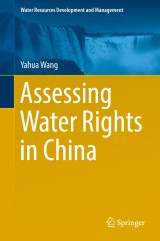Details

Assessing Water Rights in China
Water Resources Development and Management
|
85,59 € |
|
| Verlag: | Springer |
| Format: | |
| Veröffentl.: | 14.09.2017 |
| ISBN/EAN: | 9789811050831 |
| Sprache: | englisch |
Dieses eBook enthält ein Wasserzeichen.
Beschreibungen
<p>This book presents a model for describing the hierarchical concept of China’s water rights structure, one which takes into account pioneering theories on natural resources and environmental institutional economics. It highlights the basic theory of water rights, with a view to helping Chinese policymakers acquire a deeper understanding of water rights and the need for a reform program in the long-term development of water-poor China. To do so, it draws on three main sources: Cheung SNS’s “Economic Explanation”, Douglas C. North’s “New Economic History” and Ray Huang’s “Macro History”.</p><p>The book makes two essential contributions: it elaborates the hierarchical water governance structure in China, which originated in the Qin Dynasty that unified the country 2000 years ago and has been employed without interruption ever since; further, it constructs a choice model for water governance structures and advances the logic of making structural choices with minimum transaction costs under constraint conditions, while also explaining the inherent nature of China’s choice for the hierarchical structure from the perspectives of management cost and cooperation cost. As such, the book enriches and builds on the theories of the “water governance” school represented by Karl Marx, Karl Wittfogel and Ray Huang, laying the foundation for the further study of water rights theory in contemporary China.</p>
Introduction.- Hierarchical Structure of Water Governance.- Hierarchical Structure of Water Rights.- Economics Theory of Water Rights Structure.- Water Rights Structure in Ancient China and its Economic Explanation: Empirical Study of the Yellow River Basin.- Water Rights Structure of the Yellow River Basin and Its Economic Explanation: Since the Founding of New China.- Water Rights and Water Market of Contemporary China: Case Study.- Conclusions and Prospects.<br>
Dr. Wang is a Professor of the School of Public Policy and Management, and the vice president of China Institute for Rural Studies, Tsinghua University. His main research fields include contemporary China studies and public policy, Institutional analysis and commons governance, water resources management. Dr. Wang received his Ph.D. and Master in management science and Bachelor in hydraulic engineering from Tsinghua University. As a visiting scholar 2009–10 with Prof. Elinor Ostrom at the Ostrom Workshop in Political Theory and Policy Analysis at Indiana University, he is one of the leading scholars to follow up Bloomington School’s tradition studying the commons in China. He was an assistant director of Water Administration Bureau in Yellow River Conservancy Commission for one year, during this period he investigated water management conditions of eight riparian provinces down the Yellow River. Dr. Wang provides consultation for many international and domestic institutes, such as WWF,WRI, AusAID, JICA, CCICED, MWR-China, NDRC-China. He has published ten books and more than one hundred articles in academic journals.<br>
<p>This book presents a model for describing the hierarchical concept of China’s water rights structure, one which takes into account pioneering theories on natural resources and environmental institutional economics. It highlights the basic theory of water rights, with a view to helping Chinese policymakers acquire a deeper understanding of water rights and the need for a reform program in the long-term development of water-poor China. To do so, it draws on three main sources: Cheung SNS’s “Economic Explanation”, Douglas C. North’s “New Economic History” and Ray Huang’s “Macro History”.</p><p>The book makes two essential contributions: it elaborates the hierarchical water governance structure in China, which originated in the Qin Dynasty that unified the country 2000 years ago and has been employed without interruption ever since; further, it constructs a choice model for water governance structures and advances the logic of making structural choices with minimum transaction costs under constraint conditions, while also explaining the inherent nature of China’s choice for the hierarchical structure from the perspectives of management cost and cooperation cost. As such, the book enriches and builds on the theories of the “water governance” school represented by Karl Marx, Karl Wittfogel and Ray Huang, laying the foundation for the further study of water rights theory in contemporary China.<br/></p>
Reflects pioneering theories on institutional environmental and economic resources Presents a model for describing the hierarchical concept of China’s water rights structure Highlights a systematic economic theory on water rights structure and describes its precise meaning Explores the possibility of introducing a dynamic market mechanism into the hierarchical structure and its use to make a case study of the water market in contemporary China Highlights China’s current water crisis as essentially a crisis of governance due to inadequate management cost spending on the part of the state Includes supplementary material: sn.pub/extras
Diese Produkte könnten Sie auch interessieren:

Decision Support Systems for Risk-Based Management of Contaminated Sites

von: Antonio Marcomini, Glenn Walter Suter II, Andrea Critto

96,29 €

Dynamics of Mercury Pollution on Regional and Global Scales

von: Nicola Pirrone, Kathryn R. Mahaffey

149,79 €














